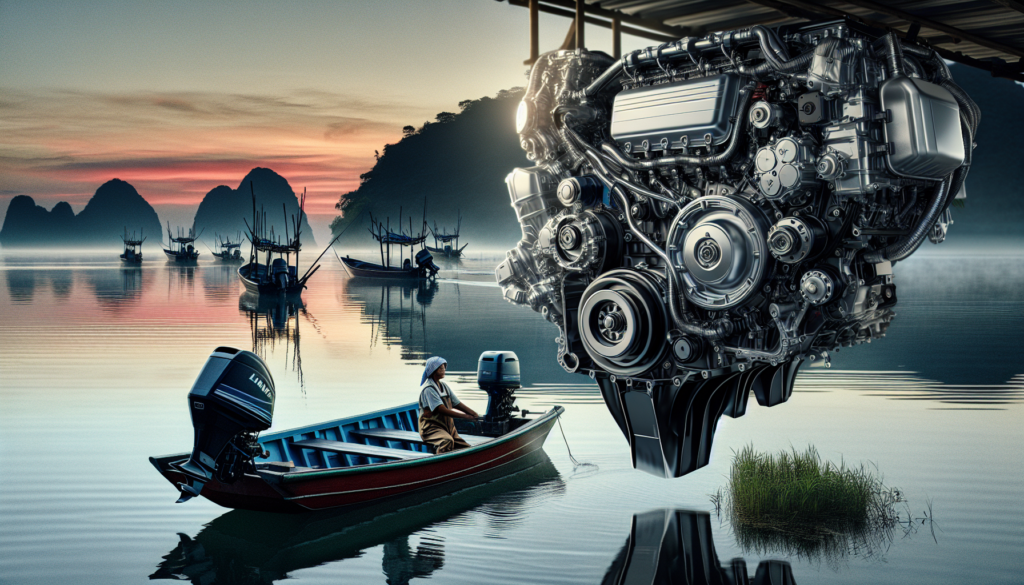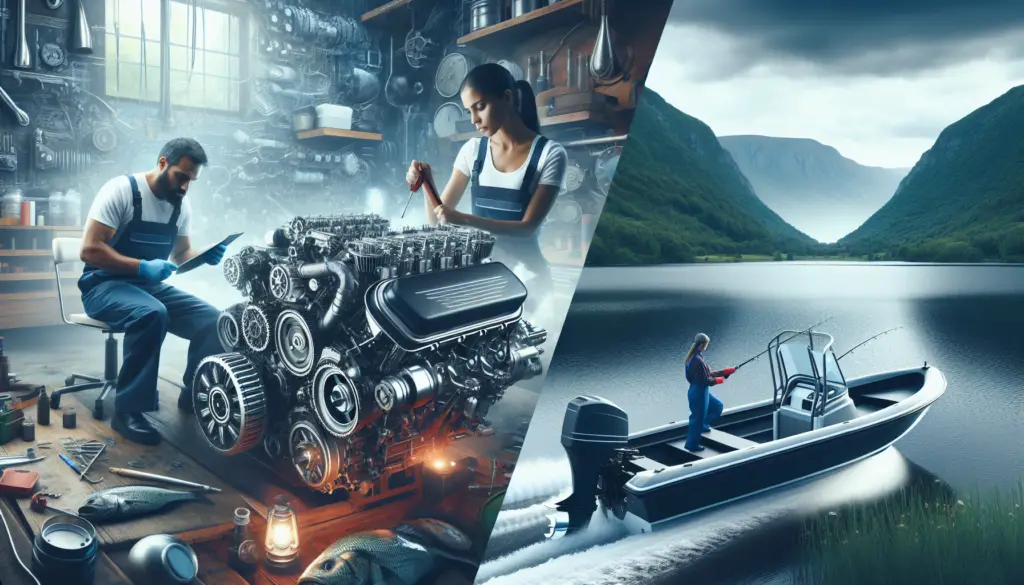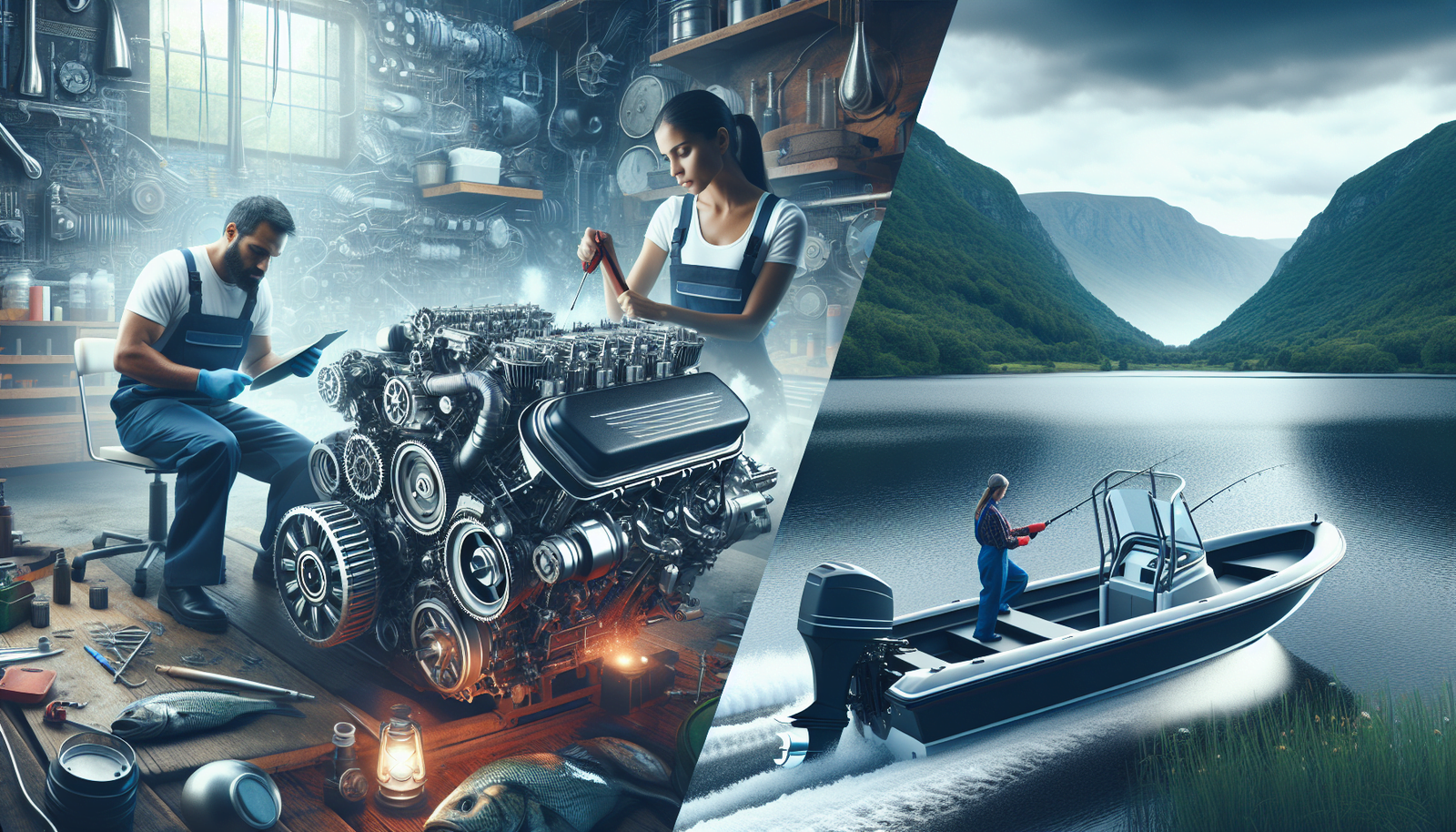If you’re a fishing enthusiast, then you know that the performance of your boat’s engine is key to a successful trip. This article, “How To Efficiently Power Your Fishing Boat Engine,” provides practical tips and tricks that will ensure your engine runs smoothly, preserving its lifespan while saving you money. You’ll learn superior fuel management, preventive maintenance strategies and ways to improve engine efficiency. By the end, you’ll have the knowledge to power your fishing boat engine like a seasoned pro.

Understanding Your Fishing Boat Engine
When it comes to powering your fishing boat, you must first understand the type of engine you’re working with. Just like vehicles, different fishing boats use different engines depending on factors like the size of the boat, where you plan on using it, and how often you plan on out on the water.
Knowing Your Engine Type
The two main types of boat engines are outboard and inboard engines. Outboard engines are mounted outside the boat’s hull. They are portable, easy to handle, and ideal for small boats or dinghies. On the other hand, inboard engines are built into the boat. They offer more power and stability, making them suitable for larger boats and yachts.
Understanding the Mechanics of Boat Engines
For the engine to work efficiently, it needs three things: air, fuel, and spark. Air and fuel mix in the carburetor or fuel injector. The spark plug ignites this mixture, pushing the piston down and turning the crankshaft to power the boat. Anything that disrupts this process can result in a loss of power or engine failure.
Importance of Regular Maintenance
Regular maintenance is critical for the smooth functioning and longevity of your fishing boat’s engine. It can prevent major engine trouble that could leave you stranded at sea and can also help maintain the engine’s efficiency, resulting in lower fuel consumption.
Choosing the Right Fuel
The type of fuel your fishing boat’s engine needs is essential to consider.
Understanding Different Fuel Types
Gasoline and diesel are the most common fuel types used in boat engines. Gasoline is preferred by many boat owners because it is readily available and less expensive than diesel. However, diesel engines are more efficient and have a higher energy density than gasoline, meaning you can travel farther on the same amount of fuel.
Pros and Cons of Different Fuels
Both gasoline and diesel have their pros and cons. Gasoline is less expensive and widely available but can degrade faster if stored for long periods. Diesel provides more energy per gallon and is safer to store because it’s less flammable, but it can be more expensive and challenging to find in remote areas.
Best Fuels for Specific Engine Types
The best fuel type for your engine depends on the engine design. Gasoline is suitable for two-stroke and four-stroke outboard engines. On the other hand, diesel is best for inboard engines due to its high energy density and lower risk of explosion.
Fuel Efficiency Techniques
There are several techniques you can employ to improve the fuel efficiency of your boat engine.
Utilizing Energy Saving Modes
Most modern boat engines come with energy-saving modes that optimize engine performance for fuel efficiency.
Keeping Engine Throttle Optimal
By adjusting the throttle to the optimum level, you can balance speed and fuel consumption. Over-throttling your engine can lead to higher fuel consumption without necessarily increasing your speed significantly.
Balancing Weather Conditions and Fuel Use
Strong winds, rough seas, and currents can drastically affect the fuel efficiency of your boat. By understanding and predicting these conditions, you can plan your travel accordingly and save fuel.
Regular Engine Maintenance
Regular engine maintenance is crucial for an efficiently running boat.
Schedule for Routine Check-ups
Scheduling regular engine check-ups will ensure that potential issues are spotted and addressed early. This keeps your engine running smoothly and prevents any long term damage.
Maintaining Fluid Levels
Maintaining appropriate levels of engine oil, coolant, and fuel can enhance your engine’s performance and ensure its longevity.
Cleaning and Replacing Engine Components
Regularly cleaning your boat’s engine and replacing worn out components when necessary can drastically boost its fuel efficiency and overall performance.

Utilizing Solar Power
Solar power is a great alternative or supplement to traditional boat engines.
Pros and Cons of Solar Power
Solar power is a clean and renewable energy source. It’s cost-effective in the long run and reduces your boat’s carbon footprint. However, the initial investment for solar panels is high and they rely on weather conditions for optimal efficiency.
Installing Solar Panels on Your Boat
Solar panels can be installed on the deck of your boat. It’s important to position these panels where they won’t be shaded by other structures on the boat, like the mast or cabin.
Maintenance of Solar Energy System
Solar panels require minimal maintenance. Regular cleaning and inspections for any damage or loose connections are generally all that’s needed.
Installing Efficient Propellers
The right propeller can increase your boat’s efficiency.
Choosing the Right Propeller Type
There are many types of propellers available, including three-blade, four-blade, and five-blade options. Your choice should be based on your boat’s size, the engine’s horsepower, and your typical boating activities.
Benefits of Using Efficient Propellers
Efficient propellers reduce drag and require less engine power, thus reducing fuel consumption.
Regular Maintenance of Propellers
Like with all boat components, regular maintenance is crucial. Propellers should be routinely inspected for any dents, cracks, or other damages.
Proper Loading of Your Boat
How you load your boat has a significant impact on its performance and fuel efficiency.
Balancing Weight for Efficiency
Balancing the weight of your items can optimize your boat’s performance by reducing drag and improving stability.
Avoiding Overloading
Overloading your boat not only affects its performance but also increases fuel consumption.
Optimal Distribution of Load in the Boat
Distribute your load around your boat evenly and keep heavy items low to reduce the center of gravity and maintain balance.
Hull Maintenance and Efficiency
The condition of your boat’s hull heavily influences its efficiency.
Importance of Regular Hull Cleanings
Regular cleanings can remove any algae, barnacles or other debris that create drag and reduce your boat’s speed.
Relationship Between Hull Condition and Fuel Efficiency
A clean, smooth hull reduces drag, which increases speed and fuel efficiency.
Handling Hull Repairs
It’s important to promptly address any damages to the hull. Even minor damages can worsen over time, affecting your boat’s performance and safety.
Operating Boat Efficiently
How you operate your boat impacts its efficiency.
Optimizing Speed for Efficiency
Maintaining an optimal speed increases your boat’s fuel efficiency. Too fast or too slow can both lead to increased fuel consumption.
Influence of Weather and Sea Conditions
Weather and sea conditions affect your boat’s fuel efficiency. Therefore, plan your boat trips with weather forecasts and sea conditions in mind.
Navigating Currents for Fuel Efficiency
Navigating with the current significantly reduces the energy your boat needs to move, thus saving fuel.
Adopting Green Practices
Green practices can contribute to fuel efficiency and the environment.
Understanding Impact on Environment
Boating, like many other activities, can have a negative impact on the environment. But with awareness and responsible practices, you can reduce this impact.
Effective Waste Disposal Methods
Proper waste disposal while at sea can help protect the marine environment. Ensure you have appropriate waste management systems in place on your boat.
Efficient Use of Energy Resources
By using energy more efficiently, you can reduce your fuel consumption and emissions. This could involve using energy-efficient appliances or switching to renewable energy, like solar power.
Endeavor to be a responsible boater, keeping your boat in great shape, and your fuel usage low helps to protect the aquatic ecosystems you love so much.

